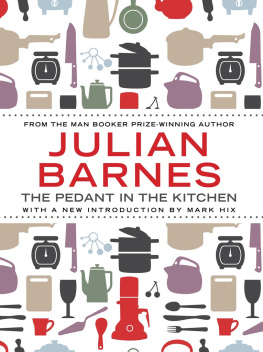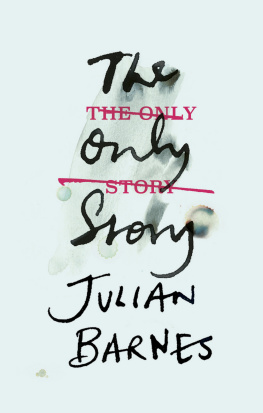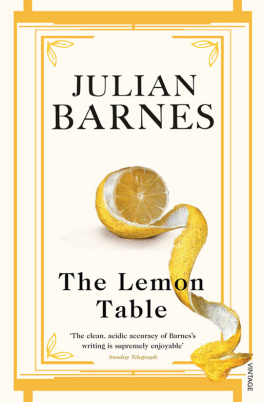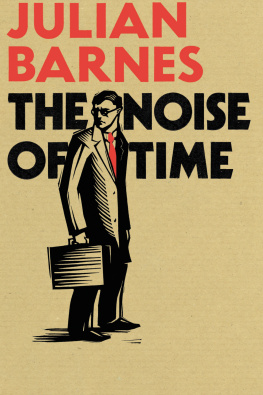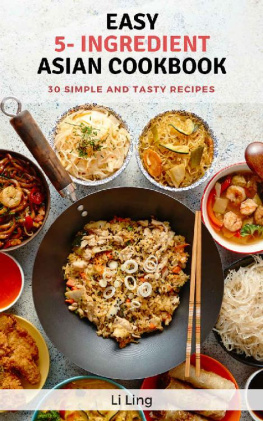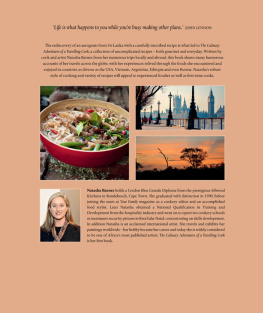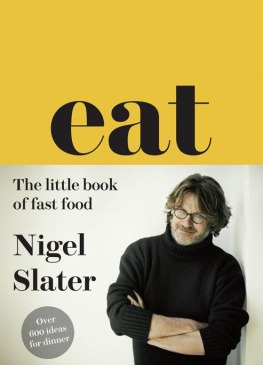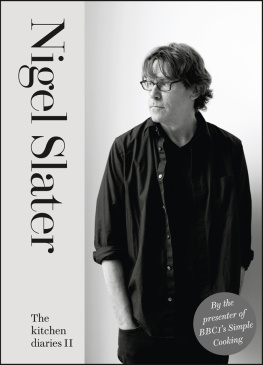THE PEDANT IN THE KITCHEN
Julian Barnes has written ten novels, three books of short stories, and two collections of essays. He has received several awards and honours for his writing including the Somerset Maugham Award (Metroland 1980), four Booker Prize nominations (Flauberts Parrot 1984, England, England 1998, Arthur and George 2005 and The Sense of an Ending, winner of the Man Booker Prize 2011). In 2004 he was made Commandeur de lOrdre des Arts et des Lettres.
All those preoccupations of the keen cook are examined with a wry and truthful eye. His assessments of such writers as Richard Olney and Elizabeth David are spot on. He notes the latters In cooking the possibility of muffing a dish is always with us, leaving the implied comment hanging in the air and his reader smiling. Spectator
Barnes identifies in scintillating style the true gulf that exists between food writers and their audience. Anyone who has eaten cooked food should read Pedant in the Kitchen. When you have picked yourself, helpless with laughter, off the lino, it will save you a fortune in cookery books and kitchen gadgets. Daily Express
Barnes is, as always, precise, humorous and informative... A curiously palatable little book. Evening Standard
In this delicious collection of bite-sized articles, Julian Barnes amateur cook but a connoisseur of cookbooks launches a broadside at the inanities and inaccuracies of recipe-writers... It is frequently laugh-out-loud funny, and Barnes frustrations and outright failures endear him to the reader immensely. This is a little hob-side classic. Scotland on Sunday
Lyrical on onions, nostalgic on frozen peas, and acerbic on the trickiness of misleading recipe-book photos, Barnes puts almost as much elegance and thought into this series of short essays as into his fiction. Fizzing with decades of pent-up frustration and creative rebellion, this is a tiny masterpiece of observational wit. The Herald

www.julianbarnes.com
First published in 2003 by Atlantic Books, on behalf of Guardian Newspapers Ltd.
Atlantic Books is an imprint of Atlantic Books Ltd.
This revised hardback edition published by Atlantic Books in 2012
Copyright Julian Barnes 2003
Introduction copyright Mark Hix, 2012
The moral right of Julian Barnes to be identified as the author of this work has been asserted in accordance with the Copyright, Designs and Patents Act of 1988.
The moral right of Mark Hix to be identified as the author of the introduction has been asserted in accordance with the Copyright, Designs and Patents Act of 1988.
The Guardian is a registered trademark of the Guardian Media Group Plc. Guardian Books is an imprint of Guardian Newspapers Ltd.
All rights reserved. No part of this publication may be reproduced, stored in a retrieval system, or transmitted in any form or by any means, electronic, mechanical, photocopying, recording, or otherwise, without the prior permission of both the copyright owner and the above publisher of this book.
10 9 8 7 6 5 4 3 2 1
A CIP record for this book is available from the British Library
ISBN 978-0-85789-654-4
E-book ISBN 978-0-85789-974-3
Designed by Richard Marston
Illustrations by Joe Berger
Printed in Great Britain
Atlantic Books Ltd
Ormond House
2627 Boswell Street
London
WCIN 3JZ
to She For Whom
INTRODUCTION
In recent years, cookbooks have become immensely popular as Christmas and birthday presents; the gastronomes collection amasses quickly. Sometimes, a couple of books become trusted favourites, containing recipes that we return to again and again. By and large, however, these books remain unopened on their shelves, their colourful spines and toothsome covers providing nothing more than another decorative element to the kitchen. Over the years, Ive become rather obsessed with collecting cookbooks, old and new. It gives me comfort to have a wall full of them but, though I now have a couple thousand of the things, I consult only a tiny fraction of them very occasionally. They are an invaluable resource for research and inspiration when Im writing.
The Pedant in the Kitchen spells out what many chefs think about recipe writing, but rarely get the chance to voice. Its not difficult to knock out a recipe, but being sympathetic to the reader is all too often overlooked. I remember years ago sitting on a panel with one of my favourite cookery writers. She said something to the audience, to which I try to adhere when writing. Every time I write, I can hear her saying these words: Whenever a reader sees an instruction to cook something gently in butter for more than four minutes they either give up or end up burning it. Two to three minutes is perfectly adequate in all recipes. This has stayed with me to this day and, as Julian Barnes quite rightly points out, recipes are seldom written with the under-confident cook in mind. Even the chefs in my restaurants dont read recipes these days and it drives me bonkers that as well as training them to cook, I have to teach them to follow each step of a recipe meticulously, chopping the vegetables in the right manner, and always using the correct measurements. The recent vogue in recipe writing for a glug of this and a dollop of that has a lot to answer for.
As well as writing recipes, there is also a certain art to reading and executing them. As Julian has discovered, its well worth reading the recipe a couple of times before you shop and prior to cooking in order to fully understand what youre up against. I never like to pre-plan my dinner party menus before I go shopping as I am frequently disappointed when the ingredients arent available. This is where gastronomic conservatism loosens its grip and carefree marketing, as Julian puts it, kicks in. But I say go for it: let loose, buy what looks and smells good. Try to shop a day or two beforehand so you have time to revisit the menu and shop again if needs be. Buy the ingredients for your main course first, then its easier to plan starter and pudding.
I think schools are largely to blame for a national lack of confidence in the kitchen. Doing away with the widespread availability of domestic science, or food technology as its now sometimes laughably called, has created a nation of gastronomically illiterate adults. What is still (just about) taught nowadays in schools is clinical and boring, but cooking is about passion, common sense and doesnt need to be that technical at all. Food Technology sounds like some sort of science lesson that prepares you for a career in a laboratory rather than a part of the school curriculum that prepares you for life (we all have to eat, after all): knocking up simple meals at home and entertaining your friends.
Last year I was invited back to my alma mater, Sir John Colfox School in Bridport, to open the sixth-form catering department kitchen and restaurant. It was truly music to my ears to learn that the school where I had been given the option to do domestic science instead of metalwork was actually making a concerted effort to teach both boys and girls the simple art of cookery. When I was at school, there were only three of us who signed up, never thinking for one minute it would be the beginning of a career in restaurants I didnt even really want to learn how to cook! (The truth is, I hated filing away at a piece of metal for weeks on end with only a useless key holder to show for my efforts. Cooking was my only way out my escape route from the metal workshops was through the kitchen.) But ever since, Ive found it difficult to understand why it wasnt compulsory to be taught a little bit about basic cooking and ingredients at school.

